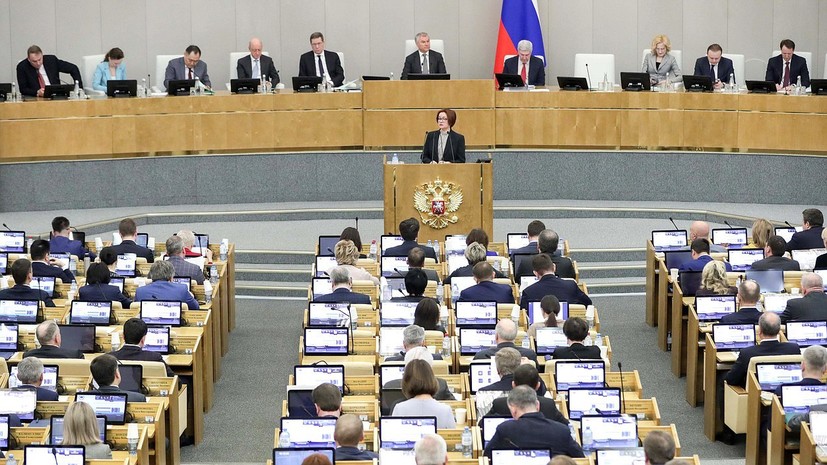On Thursday, April 21, the State Duma approved the appointment of Elvira Nabiullina to the post of Chairman of the Bank of Russia for a new term of office (338 deputies voted in favor, 83 parliamentarians opposed).
Previously, her candidacy for this post was put forward by President Vladimir Putin.
Nabiullina has been in charge of the Central Bank since 2013.
Prior to that, she headed the Ministry of Economic Development of the country and was an assistant to the president.
In 2017, the State Duma reappointed Nabiullina to the post of head of the Central Bank for another five years.
Her term of office expires on June 24.
Note that after the arrival of Nabiullina, the Bank of Russia received the status of a financial mega-regulator.
Thus, today the Central Bank is immediately responsible for supervision, regulation and development in all sectors of the Russian financial market.
In particular, we are talking about the banking system, insurance, collective investment and pension savings, the securities market and microfinance.
One of the main achievements of the Central Bank under Nabiullina was the clearing of the banking system from unscrupulous players and inefficient credit institutions.
Nikita Maslennikov, head of the Finance and Economics department at the Institute of Contemporary Development, shared this opinion in an interview with RT.
“In addition, after the first wave of sanctions in 2014, we made significant progress in developing our own payment system, which protects businesses and Russians from external pressure.
Yes, we now have problems with external payments, but inside the country all operations are going on as usual, ”said Maslennikov.
The expert also considers the policy of inflation targeting pursued by the Central Bank to be one of the most effective solutions from the point of view of the economy.
Since 2015, the regulator has been trying to stabilize the annual price growth rate in Russia near the target level of 4%.
“Before the pandemic, the Central Bank practically reached this benchmark.
Although now the external conditions have, of course, seriously changed, the Central Bank still does not abandon this goal and plans to achieve it in the next few years, ”added Maslennikov.
In addition, the actions of the regulator during the period of new sanctions largely supported the country's financial system and made it possible to quickly stabilize the situation in the banking industry and the foreign exchange market.
This was told to RT by Georgy Ostapkovich, director of the Center for Market Research at the Institute for Statistical Research and the Economics of Knowledge at the Higher School of Economics.
“Nabiullina has positively recommended herself as an anti-crisis manager.
She carried out a series of currency maneuvers, which quickly reduced the panic in the market and brought the situation under control.
Today, the Central Bank is the most progressive non-governmental body that successfully minimizes economic losses.
In this sense, the Central Bank is confidently ahead of some other departments,” Ostapkovich said.
According to experts interviewed by RT, in the current conditions, one of the key challenges for the Russian economy has become the blocking by the West of half of the country's gold and foreign exchange reserves.
However, the policy pursued by the regulator made it possible to mitigate the impact of these actions on the Russian financial sector.
Thus, over the past eight years, the share of the dollar in Russian reserves has decreased by almost four times - to 10.9%.
At the same time, the share of gold doubled to 21.5%, while the share of the yuan rose from zero to 17.1%.
“Since 2014, the Bank of Russia has been consistently pursuing a policy of building up and diversifying international reserves in order to have, in fact, two safety cushions: in case of materialization of financial risks, when the financial market’s need for US dollars and euros is high, and in case of a geopolitical crisis, when be restricted Russia's access to most reserve currencies.
And now, after the freezing of reserves in their currencies by Western countries, Russia continues to have a sufficient amount of reserves in gold and yuan, ”Elvira Nabiullina explained earlier.
According to her, as early as mid-2022, the Russian economy will enter a period of structural transformation.
At the same time, according to Nikita Maslennikov, the current exchange rate of the Central Bank will allow businesses and the financial sector to quickly adapt to new conditions.
“This is, in particular, the planned course for lowering rates, which will support business activity in the country.
The course towards the introduction of the digital ruble has been confirmed, and we will be able to stay in the trend of digitalization of the global economy.
The Central Bank is also working on expanding the geography of countries that will accept the MIR card.
The Bank of Russia is also preparing the infrastructure to increase the share of settlements in national currencies in the structure of foreign trade.
Therefore, it is logical that Nabiullina is the most suitable candidate for the implementation of this course, ”concluded Maslennikov.

